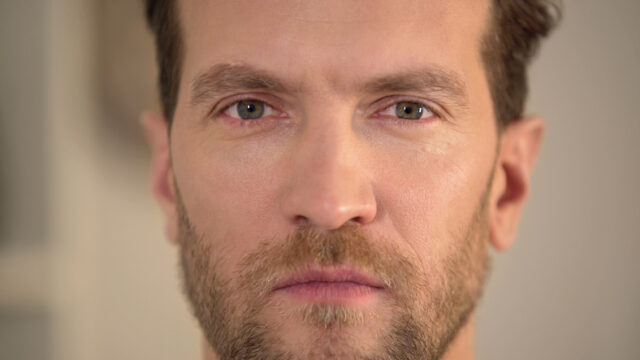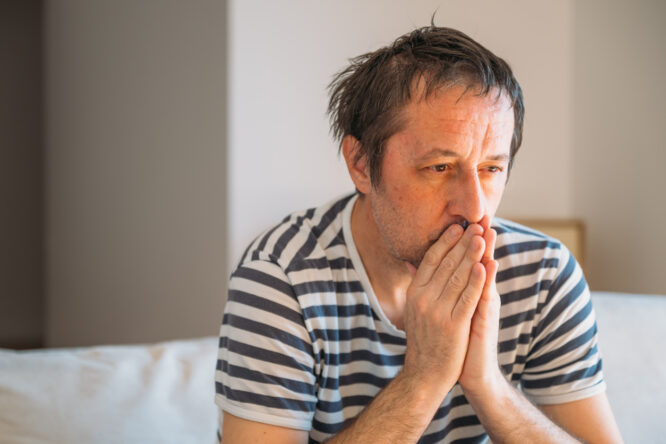We all know what physical exhaustion feels like, especially since we’ve experienced it enough times in life.

However, emotional exhaustion is a bit tougher to spot because it tends to fly under the radar. It doesn’t hit you like a ton of bricks the way physical tiredness does. Instead, it builds and builds slowly but surely in ways that seem totally normal—that is, until you realise you’re barely holding it together and everything feels heavier than it used to. These are some of the ways it manifests that you might be ignoring—or totally in denial about.
1. You feel drained no matter how much you sleep.

Even when you manage to get a full night’s rest, you still wake up feeling foggy, sluggish, or completely unmotivated. Your body might not be aching, but your mind feels like it’s been running a marathon. No amount of caffeine or naps seems to lift the weight.
That level of tiredness has little to do with physical exhaustion—it’s emotional depletion. When you’ve been under prolonged stress or holding in your feelings for too long, your system starts to shut down in subtle ways. Rest doesn’t work because what you really need is emotional relief, not just sleep.
2. You get irritated way more easily than usual.

Suddenly, everything sets you off. Someone talking too loudly, a text reply taking too long, or someone leaving dishes in the sink feels like the end of the world. Your tolerance is thin, and you know it, but you just can’t help it.
Being on edge constantly comes from your nervous system being on high alert. When you’re emotionally worn down, there’s no buffer left for small frustrations. You react quickly, not because you’re mean or snappy by nature, but because you’re mentally tapped out and desperately need space.
3. You feel disconnected from your own emotions.

Sometimes it’s not that you feel overwhelmed—it’s that you barely feel anything at all. You go through your day on autopilot, doing what needs to be done, but inside, everything feels flat. You’re not sad, you’re not happy—you’re just there.
Existing in a regular state of numbness isn’t laziness or lack of care. It’s a sign that your emotional capacity has been maxed out. Your brain may be shutting down emotional responses as a defence mechanism, trying to keep you safe from further stress or overload, even if it leaves you feeling distant from yourself.
4. You struggle to care about things you used to enjoy.

Your favourite shows don’t hold your attention. Hobbies feel like effort. Conversations feel draining instead of uplifting. You find yourself saying, “I don’t have the energy for this,” more and more, even when the thing in question used to bring you joy.
When emotional exhaustion sets in, joy often becomes muted. It’s not that your passions have disappeared—it’s that your emotional bandwidth has been completely used up. The things you used to love are still there, but your capacity to fully experience them needs time and care to return.
5. You get overwhelmed by things that used to feel easy.

Simple tasks like checking emails, going to the store, or making a phone call suddenly feel impossible. Everything starts to pile up, not because the tasks are too hard, but because your energy is too low to handle them.
That level of overwhelm is often misunderstood. It’s not laziness or procrastination; it’s a sign that your inner world is overloaded. When your mental and emotional energy is depleted, even things that used to be second nature can feel like mountains to climb.
6. You start avoiding people more than usual.

Calls go unanswered. Messages sit unopened. Plans you were once excited about now seem exhausting. You might even feel guilty about how much you’re pulling back, but you just can’t bring yourself to engage the way you normally would.
This social withdrawal is often misunderstood as flakiness or indifference, but it’s really about emotional protection. When your tank is empty, even a kind conversation can feel like too much. Your instincts are telling you to conserve energy, even from people you love.
7. You cry more easily, or not at all.

Sometimes, something small can trigger unexpected tears—an ad, a conversation, or even a moment of silence. Other times, you feel like you should be crying, but nothing comes. Your emotional responses feel inconsistent, like they’re out of sync with what’s actually happening.
Both of these reactions are common signs of emotional overload. Crying easily can be your body’s release valve. Shutting down completely can be your body protecting you from further pain. Either way, it’s your nervous system reacting to being stretched too far for too long.
8. You feel like everything is “too much” all the time.

No matter how minor the request, it feels like another thing you just can’t deal with. The idea of making one more decision, replying to one more email, or thinking about what’s for dinner feels absurdly overwhelming.
This persistent sense of overload can build slowly, until everything feels urgent, even when it’s not. When your emotional capacity is used up, your system stays in survival mode, where everything feels like a threat, even if it isn’t one.
9. You can’t concentrate like you used to.

You sit down to focus, but your thoughts wander. You reread the same sentence five times. You start one task and end up doing three others without finishing any. Nothing seems to stick, no matter how hard you try to focus.
Emotional exhaustion clouds your ability to think clearly. Your brain is so busy trying to regulate stress in the background, it can’t stay present in the moment. Concentration takes energy, and when that energy is gone, even your thoughts feel scattered.
10. You start doubting yourself over everything.

Suddenly, you question your decisions, your value, and your abilities. Things you used to do confidently now come with hesitation. You over-explain, over-apologise, or assume you’re getting everything wrong even when there’s no evidence to support it.
That creeping insecurity is often tied to burnout. When you’re emotionally exhausted, your inner critic gets louder, and your self-trust weakens. It’s not because you’ve suddenly become incapable. It’s because you’re mentally running on fumes.
11. You feel stuck in survival mode.

Your days feel like a cycle of waking up, doing what’s necessary, and collapsing at the end. There’s no space for reflection, joy, or real rest—just a constant effort to keep going, even when every step feels heavy.
Living in survival mode for too long makes you feel like you’re existing instead of living. It’s not always dramatic or visible to other people, but inside, you know you’re functioning well below your normal capacity, and there’s no energy left to fix it.
12. You resent people who seem carefree.

Seeing everyone else relaxed, playful, or energetic can spark a surprising amount of frustration. You don’t want to feel resentful, but it’s hard when their freedom reminds you of how trapped or tired you feel inside.
That reaction isn’t because you’re jealous. It’s a sign of how you’re feeling about your own life. It reflects how deeply you’re craving relief, joy, and ease, even if you haven’t admitted it to yourself yet. That inner frustration is just trying to point you toward what you’re missing.
13. You keep telling yourself “I’m fine” when you’re clearly not.

You downplay your stress, pretend everything’s under control, or brush off concern from other people. Saying “I’m fine” becomes automatic, even though you know you’re not. You tell yourself to just push through a little longer.
That habit doesn’t make you strong; it makes you silently suffer. Emotional exhaustion thrives in silence. Admitting you’re not okay doesn’t mean you’re falling apart. It means you’re finally giving yourself permission to stop pretending and start healing.




